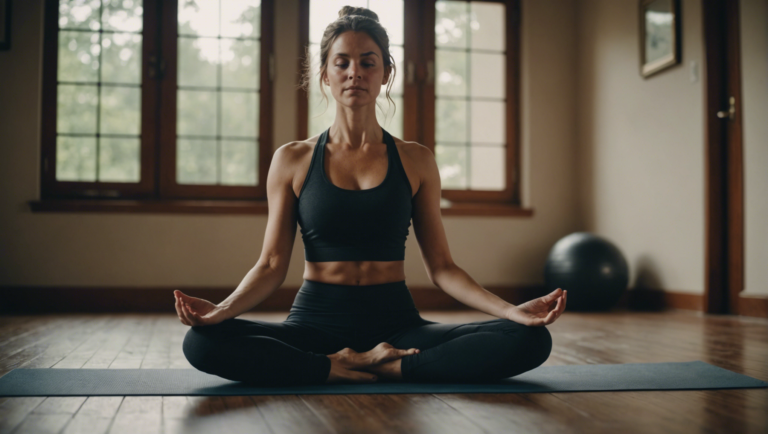How Much Daily Yoga Is Beneficial For Your Health?
The Ideal Duration of Daily Yoga Practices for Optimal Health Benefits
Engaging in daily yoga practices can significantly enhance your overall well-being, but determining the ideal duration for these sessions to yield optimal health benefits is a nuanced topic. It requires an understanding that transcends conventional wisdom, integrating insights from both ancient tradition and contemporary scientific research.
The Significance of Daily Practice
Yoga, an ancient form of exercise rooted in Indian philosophy, has been widely acknowledged for its profound benefits on mental, physical, and spiritual health. A consistent practice can lead to improved strength, flexibility, balance, and stress reduction. More than just a series of poses, yoga encompasses meditation and breathing techniques that foster mindfulness and relaxation.
Balancing Duration with Lifestyle
The first step towards integrating yoga into your daily routine is acknowledging the balance between session duration and your lifestyle. While traditional teachings advocate for longer periods of practice, modern-day constraints necessitate a more flexible approach. The key is not the length of each session, but the consistency and dedication towards the practice.
Optimal Practice Durations
For Beginners
Those new to yoga should aim for shorter sessions, approximately 15-20 minutes per day. This duration is manageable for most people and sufficient to introduce the body to yoga’s physical demands and meditative aspects. Starting small also helps in building a habit without overwhelming the practitioner, making it easier to maintain consistency.
For Intermediate and Advanced Practitioners
As your body adapts and your familiarity with various asanas (poses) increases, you can gradually extend your practice time. For intermediate practitioners, 30-45 minutes of daily yoga is beneficial. Advanced practitioners might aim for 60 minutes or more, as their endurance and focus allow for deeper exploration of advanced asanas and longer meditation periods.
Scientific Research Supports Varied Durations
Recent studies underscore the flexibility in practice durations. Research suggests that even short daily practices can lead to significant improvements in health markers such as blood pressure, stress levels, and body composition. Moreover, yoga’s adaptability allows individuals to tailor session lengths based on personal goals, time availability, and physical capability.
Quality Over Quantity
It’s crucial to emphasize that the quality of your yoga practice holds more importance than the quantity. Focusing on the alignment in each posture, the smoothness of your breath, and the mindfulness of your practice will yield more substantial benefits than merely extending the duration of your sessions. This mindful approach ensures that every minute spent on the mat contributes to your holistic well-being.
Listening to Your Body
A fundamental principle of yoga is ahimsa, which means non-violence or non-harm. This principle should apply to how you approach the duration of your practice. Listen to your body and recognize the signs it gives you. Some days, a longer session may feel rejuvenating; on others, a brief practice may be all your body requires and can handle.
Variability
Varying your practice can also play a vital role in sustaining interest and maximizing health benefits. different styles of yoga, such as Vinyasa for cardiovascular health, Yin for deep tissue and fascial release, or Restorative for relaxation and stress reduction, can make each session unique and beneficial in its way.
Final Thoughts on Practice Duration
The ideal duration of daily yoga practices for optimal health benefits is not a one-size-fits-all formula. It’s a personal journey that takes into consideration your lifestyle, goals, and the changing needs of your body. The consensus among yoga teachers and health professionals is clear: a consistent yoga practice, irrespective of its length, supports a journey towards enhanced well-being. The most valuable insight is perhaps the simplest—commit to your practice, listen to your body, and the benefits will unfold naturally.
Varieties of Yoga and Their Specific Health Advantages
Yoga, an ancient practice wi its origins tracing back over 5,000 years in India, has evolved into numerous styles and forms, each offering unique health benefits to its practitioners. Whether you’re seeking physical, mental, or emotional well-being, there’s a style of yoga that caters to your specific needs. In this detailed exploration, we delve into the varieties of yoga and outline their specific health advantages, providing you with a comprehensive guide to choosing the form that best aligns with your wellness goals.
Hatha Yoga: The Foundation of Physical Wellness
Hatha yoga is often considered the foundation of all yoga practices, focusing on physical postures (asanas) and breathing techniques (pranayama). This gentle introduction to yoga is ideal for beginners, offering a slow-paced format that emphasizes physical strength, flexibility, and calming the mind. Health benefits associated with Hatha yoga include improved muscle tone, enhanced flexibility, better stress management, and a boost in mental focus and concentration. Regular practice can lead to significant improvements in overall physical health and well-being.
Vinyasa Yoga: The Flow of Movement and Breath
Vinyasa yoga, known for its fluid, movement-intensive practice, links breath with movement, creating a dynamic flow of postures. This style is particularly beneficial for those looking to enhance cardiovascular health, as the constant movement from one pose to another increases heart rate, offering a mild cardiovascular workout. In addition to its physical benefits, such as increased strength and flexibility, Vinyasa yoga promotes mental focus and discipline, helping practitioners to develop a meditative state of mind in motion.
Bikram Yoga: The Heat is On
Bikram yoga, performed in a room heated to approximately 105 degrees Fahrenheit with 40 percent humidity, consists of a series of 26 poses and two breathing exercises. This intense environment aids in the detoxification of the body, promotes flexibility, and significantly increases calorie burn. The heat also encourages practitioners to push physical boundaries safely, enhancing endurance and stamina. Regular Bikram yoga practitioners often report improvements in cardiovascular health, weight loss, and muscle tone, alongside stress reduction and improved mental clarity.
Ashtanga Yoga: The Power of Progressive Sequences
Ashtanga yoga is characterized by its use of six series of progressively difficult postures. This style demands high levels of physical endurance, strength, and flexibility, offering a rigorous workout that promotes physical cleanliness and stamina. The consistent practice of Ashtanga yoga can lead to improvements in muscle toning, flexibility, and respiratory system efficiency. Additionally, its disciplined nature supports the development of mental focus and concentration, enhancing emotional resilience and stress management skills.
Yin Yoga: The Gentle Path to Flexibility
Yin yoga, with its emphasis on long-held passive poses, targets the deep connective tissues of the body, like the ligaments, bones, and joints. This meditative practice encourages relaxation, improves flexibility, and heals and maintains the health of connective tissues. Furthermore, Yin yoga supports emotional and mental well-being, offering practitioners a space to slow down and connect with their inner selves in a reflective and introspective practice.
Kundalini Yoga: The Awakening of Energy
Kundalini yoga combines postures, dynamic breathing techniques, meditation, and the chanting of mantras to awaken the Kundalini energy at the base of the spine. This practice aims to elevate consciousness, refine energy levels, and enhance spiritual growth. Health benefits include improved respiratory and cardiovascular systems, strengthened core muscles, stress reduction, and heightened mental clarity and awareness.
Each yoga style offers unique benefits, catering to different preferences and health objectives. Whether your goal is to build physical strength, enhance mental focus, or embark on a spiritual journey, yoga provides a versatile and comprehensive approach to wellness. Embracing the practice that resonates with your individual needs can lead to profound improvements in your health and overall quality of life.
The Role of Yoga in Stress Reduction and Mental Health
Yoga has been practiced for thousands of years, originating in ancient India. It is a holistic approach to well-being, combining physical poses, breath control, meditation, and ethical principles. In recent years, the practice has gained global popularity, not just as a form of exercise but also as an effective tool for stress reduction and enhancing mental health. This article delves into how yoga can be a powerful ally in managing stress and bolstering mental wellness, backed by research and expert insights.
The Science Behind Yoga and Stress Reduction
Yoga’s efficacy in reducing stress is rooted in its ability to decrease the levels of cortisol, the body’s primary stress hormone. Multiple studies have shown that regular yoga practice can significantly lower cortisol levels, thus reducing overall stress. Yoga also stimulates the parasympathetic nervous system, often referred to as the "rest and digest" system, which helps counterbalance the body’s stress response.
Furthermore, yoga increases the production of gamma-aminobutyric acid (GABA), a neurotransmitter that has a calming effect on the brain. Reduced GABA levels have been linked to anxiety and mood disorders. Hence, by elevating GABA, yoga offers a natural remedy for anxiety and stress.
Yoga’s Impact on Mental Health
Beyond stress reduction, yoga has shown promising results in improving various aspects of mental health. For instance, it has been used as a complementary treatment for depression, with certain yoga practices like Sudarshan Kriya Yoga showing significant antidepressant effects. The mindfulness component of yoga, which encourages present-moment awareness and acceptance, has been particularly beneficial for individuals dealing with depression and anxiety.
Yoga also promotes better sleep quality. Insomnia and poor sleep patterns are often symptoms or contributing factors to mental health issues. By incorporating yoga into one’s daily routine, individuals may experience an improvement in sleep duration and quality, which in turn, supports overall mental health.
The Role of Breathing Exercises in Stress Management
One of the key components of yoga is pranayama or breath control. Pranayama exercises are effective tools for managing stress. Techniques such as Ujjayi (Victorious Breath), Bhramari (Bee Breath), and Nadi Shodhana (Alternate Nostril Breathing) can instantly bring about a sense of calm and are particularly helpful in acute stress situations.
Breathing exercises directly affect the autonomic nervous system, helping to reduce the body’s stress response. Regular practice of pranayama has been found to improve cardiac functioning and increase heart rate variability, an indicator of the body’s ability to tolerate stress.
Starting a Yoga Practice for Stress and Mental Health
Beginning a yoga practice can be as simple as dedicating a few minutes each day to some basic poses or breath work. For those new to yoga, starting with gentle yoga or mindfulness-based stress reduction (MBSR) yoga classes may be beneficial. These classes focus on the therapeutic aspects of yoga, emphasizing stress reduction and mental well-being.
Furthermore, yoga is highly adaptable. People of all ages and physical abilities can find a style of yoga that suits their needs. Whether through vigorous Vinyasa flows or more restorative Yin practices, the key is consistency. Making yoga a regular part of one’s routine is crucial in reaping its mental health benefits.
Final Thoughts
The ancient practice of yoga extends far beyond physical exercise. Its profound benefits on stress reduction and mental health are supported by a growing body of scientific evidence. By integrating yoga into our daily lives, we can foster resilience against stress and enhance our overall well-being. Remember, the journey towards mental health is personal, and yoga offers a versatile and accessible path for that journey. Whether seeking solace from the stresses of daily life or managing more significant mental health challenges, yoga provides a powerful tool for self-care and healing.
Yoga for Physical Health: Beyond Flexibility and Strength
Yoga, often celebrated for its ability to improve flexibility and build strength, encompasses a myriad of benefits that extend far beyond these physical attributes. This ancient practice, rooted in a holistic approach towards well-being, offers profound impacts on physical health that might not be immediately apparent to the casual observer. The exploration of yoga’s deeper benefits reveals its potential to enhance cardiovascular health, boost immunity, and foster better respiratory function, among other advantages.
The Cardiovascular Benefits of Regular Yoga Practice
Regular engagement in yoga has shown promising results in improving heart health. Through mindful breathing and low-impact postures, yoga can reduce blood pressure and lower the heart rate, contributing to a decreased risk of heart disease. The calming nature of yoga practices, particularly through meditative exercises, further aids in stress reduction. Chronic stress is a known risk factor for cardiovascular issues, making yoga’s stress-relieving properties invaluable in nurturing heart health.
Enhancing Respiratory Function Through Yoga
Yoga’s emphasis on pranayama, or breath control, plays a crucial role in improving respiratory function. These breathing exercises are designed to increase lung capacity and efficiency, providing deeper and more controlled breaths. For individuals coping with mild to moderate respiratory conditions, such as asthma, yoga can offer a complementary approach to managing symptoms and enhancing overall respiratory health.
Yoga and Immunity: A Synergistic Connection
Yoga’s ability to modulate the immune system is another facet of its contribution to physical health. Regular practice has been linked with a reduction in inflammation and an increase in the circulation of immune cells. This immune-boosting effect is partly attributed to yoga’s stress-reducing exercises, as stress can significantly weaken the immune response. By promoting a state of relaxation and regulating the stress response, yoga helps maintain an effective and balanced immune system.
Metabolic Regulation and Digestive Health
Yoga’s impact on metabolic regulation and digestive health is another area where its benefits extend beyond mere flexibility and strength. Certain poses and sequences are known to stimulate digestion and enhance the functioning of the metabolic system. This can aid in more effective digestion and absorption of nutrients, while also supporting detoxification processes. Individuals with metabolic disorders or digestive issues may find yoga to be a beneficial adjunct to their treatment regimen, helping to alleviate symptoms and promote overall digestive wellness.
Enhanced Musculoskeletal Health Beyond Strength
While the strengthening aspects of yoga are widely recognized, its ability to prevent injuries and promote joint health deserves equal attention. Yoga encourages alignment and balance, which in turn, helps reduce the risk of musculoskeletal injuries. This preventive aspect is particularly beneficial for individuals engaged in repetitive motions or those susceptible to strain injuries. Moreover, yoga’s gentle stretching exercises can alleviate stiffness and pain, making it a valuable practice for those with arthritis or chronic musculoskeletal conditions.
Yoga’s contributions to physical health are comprehensive, impacting the body’s systems in a multitude of beneficial ways. From cardiovascular improvements and enhanced respiratory function to immune regulation and musculoskeletal health, the practice of yoga supports and nurtures the body in its entirety. Beyond the observable gains in flexibility and strength, its profound effects on overall well-being underscore yoga’s value as a holistic practice for physical health. Engaging in regular yoga practice can thus be seen as an investment in one’s long-term health, offering rewards that far exceed the immediate gratification of improved physical appearance or abilities.
Incorporating Yoga Into Your Daily Routine for Long-Term Well-being
As the demands of modern life continually draw on our reserves of energy and concentration, finding effective ways to maintain and enhance our personal well-being is more critical than ever. Yoga, an ancient practice rooted in over 5,000 years of Indian philosophy, has emerged as a beacon of hope for those seeking equilibrium in a turbulent world. The integration of yoga into one’s daily routine can herald a transformation, contributing to long-term health benefits that are both profound and wide-ranging.
Embracing Yoga for Enhanced Physical Health
Yoga’s physical benefits are perhaps the most tangible and observable outcomes of regular practice. Through a series of postures and breathing exercises, yoga strengthens the body, enhances flexibility, and promotes cardiovascular and respiratory health. But how much daily yoga is beneficial for your health?
Experts suggest that even a short daily practice can have significant health benefits. As little as 15 to 30 minutes of yoga per day can markedly improve one’s physical well-being. Regular engagement in yoga practices has been linked with decreased blood pressure, improved glucose levels, and enhanced muscular strength and tone.
Mental Well-being and Stress Reduction
The advantages of yoga transcend physical health, profoundly impacting mental and emotional well-being. The meditative aspects of yoga encourage mindfulness and present moment awareness, which can reduce stress and anxiety levels. A daily dose of yoga helps in cultivating a state of mental calmness and clarity, aiding in the management of stress and the enhancement of overall mood.
Boosting Immunity and Energy Levels
Yoga’s impact on the immune system is another testament to its comprehensive health benefits. By reducing stress and enhancing circulation, yoga supports the functioning of the immune system, making the body more resistant to diseases. Moreover, many practitioners report higher energy levels and improved vitality as a result of their yoga practice, attributing it to the balance it brings to both body and mind.
Tailoring Yoga to Fit Your Daily Life
Integrating yoga into daily life begins with setting realistic expectations and understanding that any amount of time dedicated to yoga is better than none. For those with busy schedules, several shorter sessions throughout the day or a focused session of yoga can be equally beneficial. The key is consistency and finding a routine that fits seamlessly into your life.
Yoga as a Path to Self-Discovery
Beyond the physical and mental health benefits, yoga offers a path to self-discovery and personal growth. It encourages introspection and a deeper connection with one’s inner self, promoting a sense of peace and contentment that permeates all aspects of life. This transformative aspect of yoga underscores its value not just as a form of exercise but as a holistic approach to well-being.
Harnessing the Power of Community Through Yoga
Yoga is not solely a solitary exercise; its practice within a community can amplify its benefits. Joining a yoga class or practicing with others provides motivation, support, and the invaluable opportunity to learn from diverse experiences. The sense of belonging and connectedness that comes from practicing yoga in a community can be a powerful catalyst for maintained engagement and deeper exploration of yoga’s multifaceted benefits.
Making Yoga a Sustainable Practice for Well-being
For yoga to truly enhance one’s well-being in the long term, it must evolve into a sustainable and enjoyable part of daily life. This requires patience, openness to learning, and a non-judgmental attitude towards oneself. As the practice deepens, so does its impact, guiding individuals towards greater health, harmony, and happiness.
The integration of yoga into daily routines stands as a testament to its timeless relevance and enduring appeal. As a comprehensive approach to well-being, yoga offers benefits that are as diverse as they are profound. Whether seeking physical improvement, mental clarity, or spiritual growth, yoga provides a path to enhanced well-being that is accessible to all.
Conclusion
Understanding the multidimensional benefits of yoga illuminates a path to holistic well-being, harmonizing the mind, body, and spirit in a practice as ancient as it is transformative. Through the exploration of yoga’s ideal duration for daily practice, we unearth the golden balance between dedicating enough time to reap the profound benefits while ensuring the practice is sustainable and enjoyable. Consistency, rather than duration, emerges as the cornerstone of yoga’s health benefits, advocating for a daily commitment that aligns with individual needs and lifestyles.
As we delve into the varieties of yoga, ranging from the serene flows of Hatha to the vigorous intensity of Ashtanga, we encounter a rich tapestry of practices tailored to diverse preferences and health objectives. Each style offers unique health advantages, from enhancing cardiovascular health to improving metabolic functions, demonstrating yoga’s versatility in catering to a broad spectrum of physical and mental health goals. This diversity not only invites practitioners of all levels but also underscores the personalized nature of yoga – a journey wherein each individual can find their own pace and path to well-being.
Yoga’s pivotal role in stress reduction and mental health is perhaps one of its most celebrated attributes. In a world where stress has become a ubiquitous challenge, yoga serves as an anchor, grounding practitioners in the present and offering a sanctuary for the mind. The meditative elements, combined with physical movement, foster a state of mindfulness that has been shown to alleviate symptoms of anxiety and depression, highlighting yoga’s capacity to nurture not only physical health but also mental and emotional resilience.
Exploring further into the realm of physical health, yoga’s benefits extend far beyond the widely acknowledged improvements in flexibility and strength. It touches the very essence of our biological framework, influencing cardiovascular health, respiratory efficiency, and hormonal balance. Yoga’s gentle yet profound impact on the body underscores its role in preventative health care, offering a natural remedy for chronic diseases and an ally in the maintenance of optimal health.
The seamless incorporation of yoga into daily routines is a testimony to its adaptability and accessibility. Whether through a few minutes of morning stretches to awaken the body or evening meditation to soothe the mind, yoga offers a versatile toolkit for health and well-being that can be tailored to fit the intricacies of modern life. This adaptability not only enhances long-term commitment but also emphasizes yoga’s philosophy of mindful living – a practice not confined to the mat but woven into the very fabric of daily existence.
The journey through yoga’s myriad benefits elucidates a holistic approach to health, where physical vitality, mental clarity, and emotional stability are not mutually exclusive but interconnected facets of well-being. As individuals worldwide embrace yoga, they contribute to a collective shift towards a more mindful, healthy, and balanced society. The universal appeal of yoga, transcending age, culture, and physical ability, serves as a vivid reminder of our shared humanity and the universal quest for health and happiness.
Embracing yoga as a daily practice is not merely an exercise routine but a commitment to a lifestyle of health, awareness, and inner peace. It underscores the profound wisdom encapsulated in this ancient practice – that in the pursuit of health, the journey itself is as important as the destination. In this light, yoga emerges not just as a series of poses, but as a way of life, offering a blueprint for holistic well-being that is both timeless and profoundly relevant in today’s fast-paced world.




